Unit 8 It must belong to Carla.单元知识点汇总 人教版九年级英语全一册
文档属性
| 名称 | Unit 8 It must belong to Carla.单元知识点汇总 人教版九年级英语全一册 | 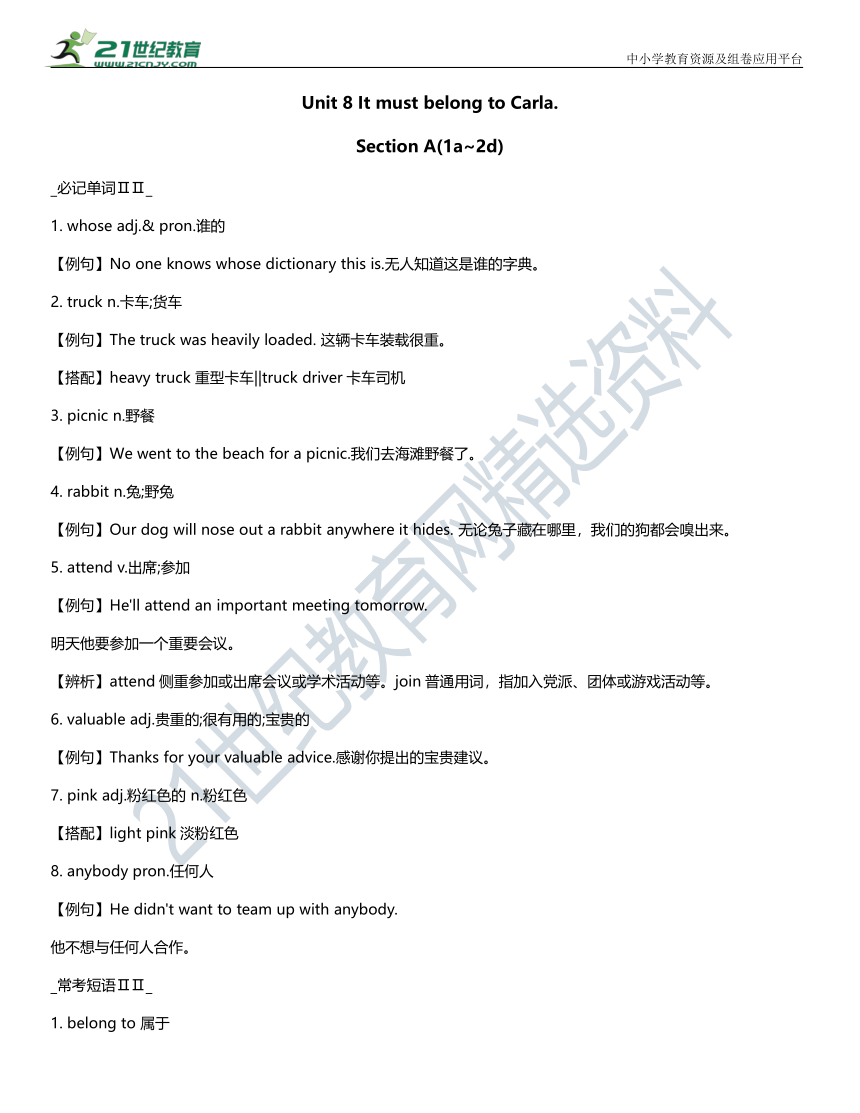 | |
| 格式 | docx | ||
| 文件大小 | 161.6KB | ||
| 资源类型 | 试卷 | ||
| 版本资源 | 人教新目标(Go for it)版 | ||
| 科目 | 英语 | ||
| 更新时间 | 2023-09-10 06:56:26 | ||
图片预览

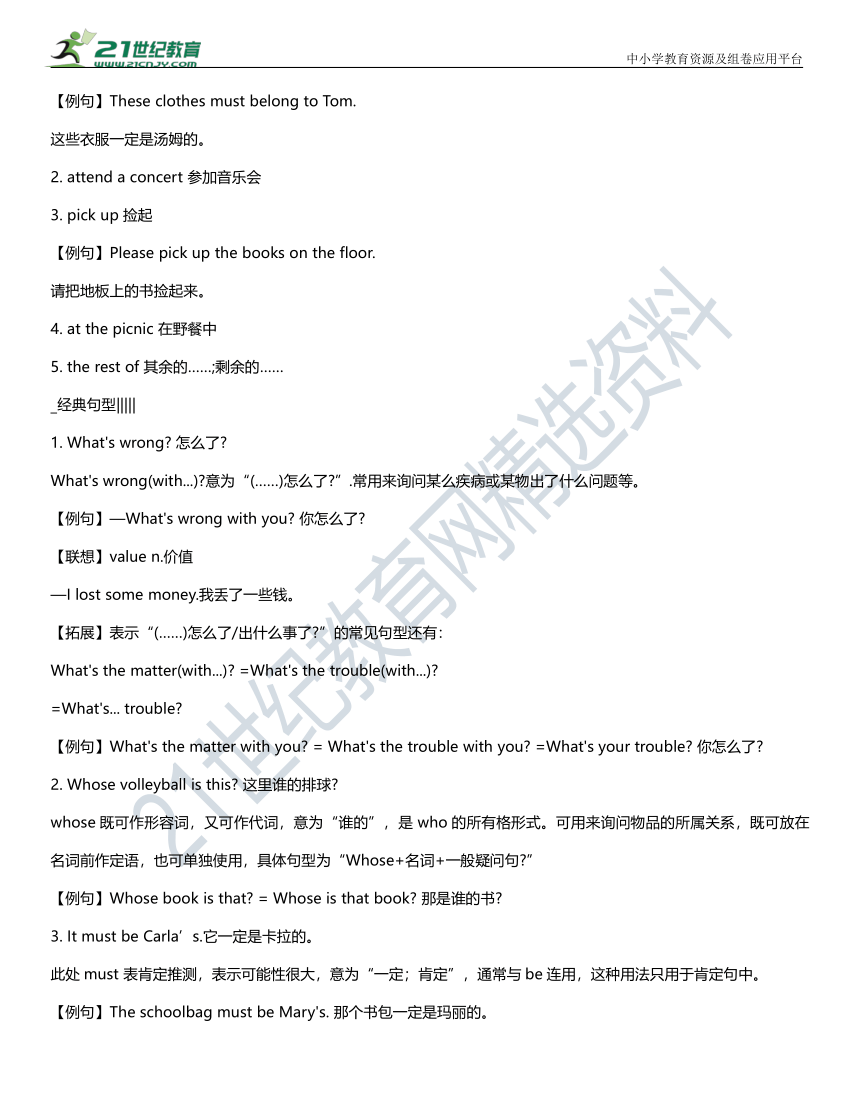
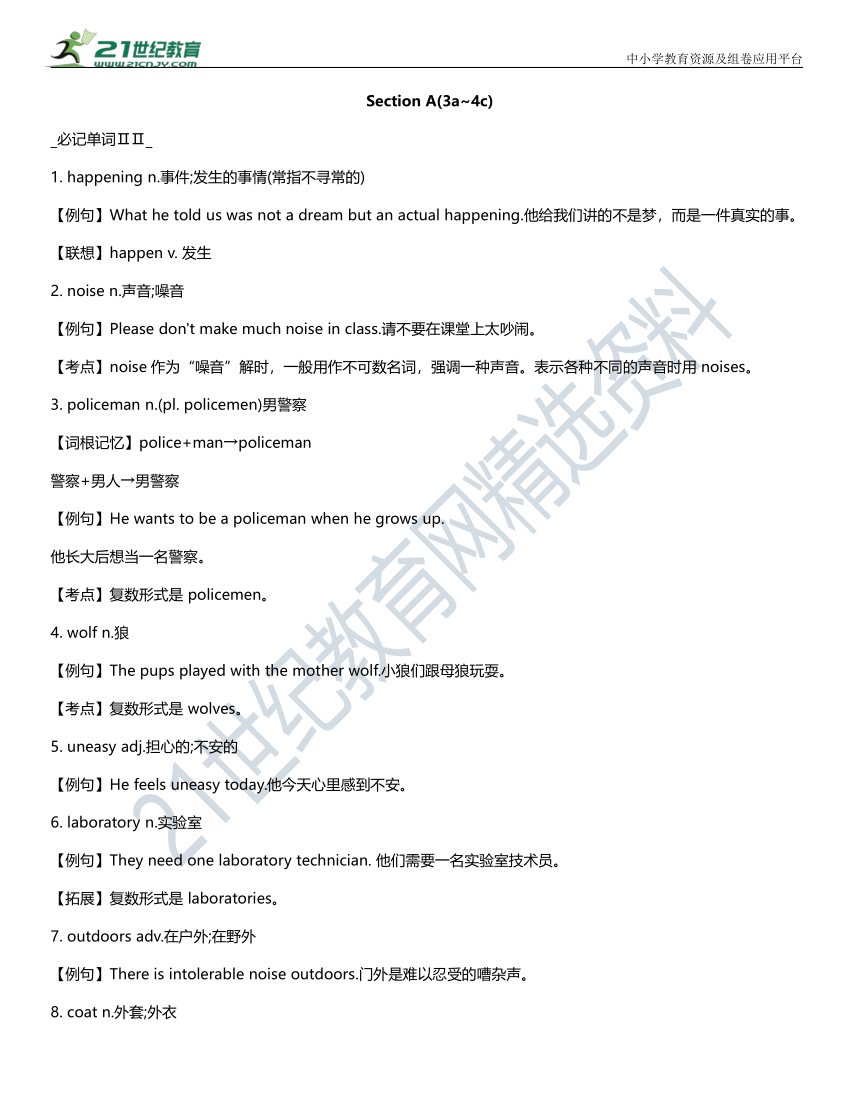
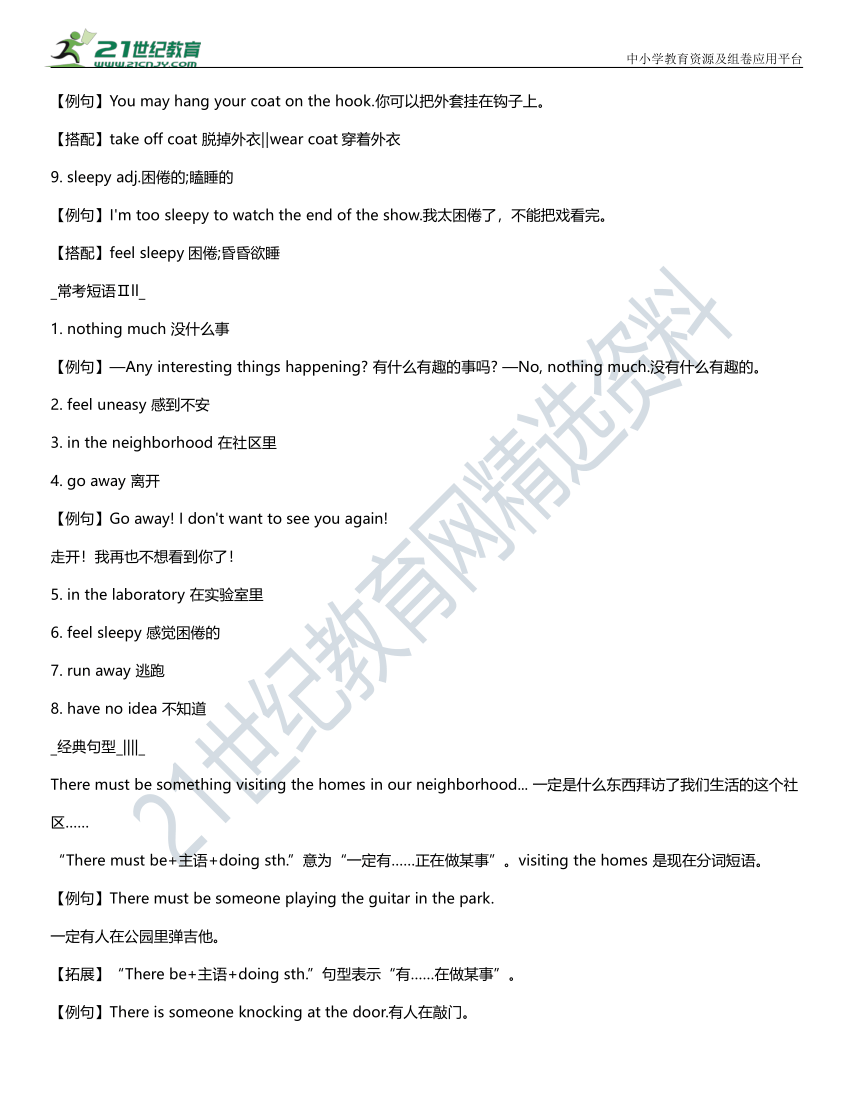
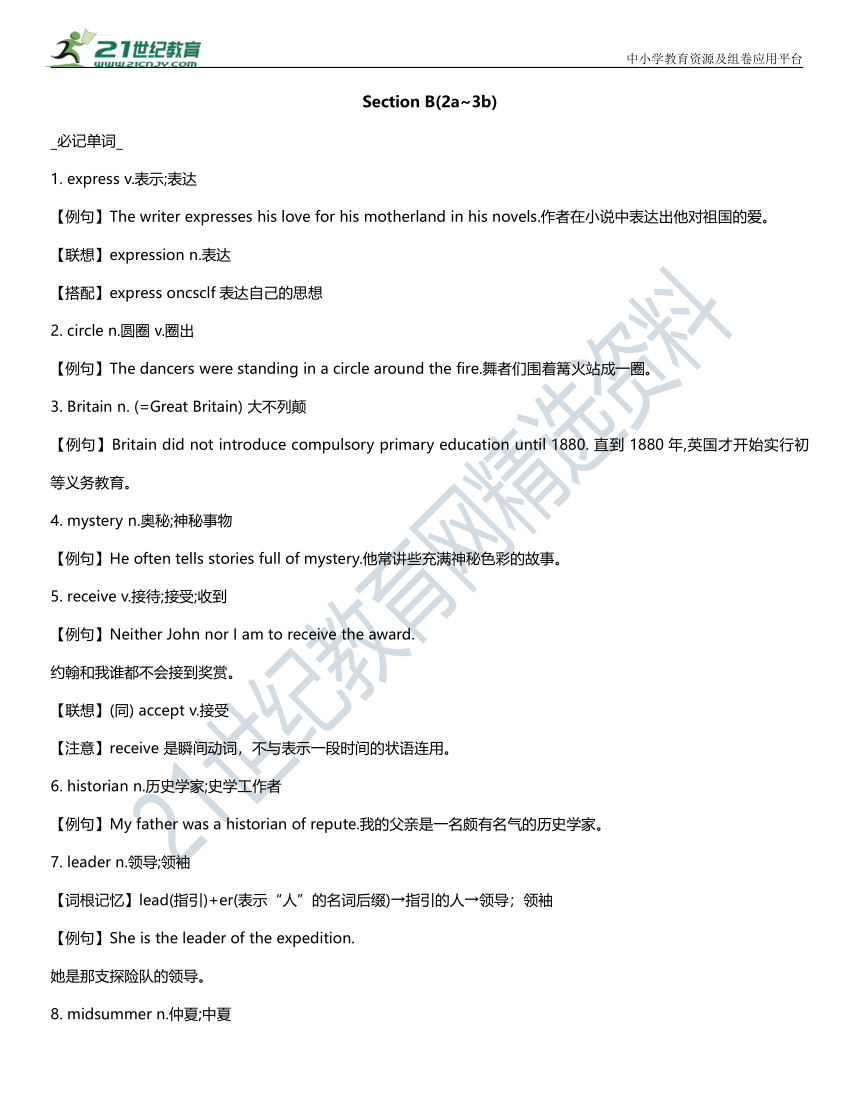
文档简介
中小学教育资源及组卷应用平台
Unit 8 It must belong to Carla.
Section A(1a~2d)
_必记单词ⅡⅡ_
1. whose adj.& pron.谁的
【例句】No one knows whose dictionary this is.无人知道这是谁的字典。
2. truck n.卡车;货车
【例句】The truck was heavily loaded. 这辆卡车装载很重。
【搭配】heavy truck 重型卡车||truck driver卡车司机
3. picnic n.野餐
【例句】We went to the beach for a picnic.我们去海滩野餐了。
4. rabbit n.兔;野兔
【例句】Our dog will nose out a rabbit anywhere it hides. 无论兔子藏在哪里,我们的狗都会嗅出来。
5. attend v.出席;参加
【例句】He'll attend an important meeting tomorrow.
明天他要参加一个重要会议。
【辨析】attend侧重参加或出席会议或学术活动等。join普通用词,指加入党派、团体或游戏活动等。
6. valuable adj.贵重的;很有用的;宝贵的
【例句】Thanks for your valuable advice.感谢你提出的宝贵建议。
7. pink adj.粉红色的 n.粉红色
【搭配】light pink淡粉红色
8. anybody pron.任何人
【例句】He didn't want to team up with anybody.
他不想与任何人合作。
_常考短语ⅡⅡ_
1. belong to 属于
【例句】These clothes must belong to Tom.
这些衣服一定是汤姆的。
2. attend a concert 参加音乐会
3. pick up 捡起
【例句】Please pick up the books on the floor.
请把地板上的书捡起来。
4. at the picnic 在野餐中
5. the rest of 其余的……;剩余的……
_经典句型|||||
1. What's wrong 怎么了
What's wrong(with...) 意为“(……)怎么了 ”.常用来询问某么疾病或某物出了什么问题等。
【例句】—What's wrong with you 你怎么了
【联想】value n.价值
—I lost some money.我丢了一些钱。
【拓展】表示“(……)怎么了/出什么事了 ”的常见句型还有:
What's the matter(with...) =What's the trouble(with...)
=What's... trouble
【例句】What's the matter with you = What's the trouble with you =What's your trouble 你怎么了
2. Whose volleyball is this 这里谁的排球
whose既可作形容词,又可作代词,意为“谁的”,是 who的所有格形式。可用来询问物品的所属关系,既可放在名词前作定语,也可单独使用,具体句型为“Whose+名词+一般疑问句 ”
【例句】Whose book is that = Whose is that book 那是谁的书
3. It must be Carla’s.它一定是卡拉的。
此处must 表肯定推测,表示可能性很大,意为“一定;肯定”,通常与be连用,这种用法只用于肯定句中。
【例句】The schoolbag must be Mary's. 那个书包一定是玛丽的。
Section A(3a~4c)
_必记单词ⅡⅡ_
1. happening n.事件;发生的事情(常指不寻常的)
【例句】What he told us was not a dream but an actual happening.他给我们讲的不是梦,而是一件真实的事。
【联想】happen v. 发生
2. noise n.声音;噪音
【例句】Please don't make much noise in class.请不要在课堂上太吵闹。
【考点】noise作为“噪音”解时,一般用作不可数名词,强调一种声音。表示各种不同的声音时用 noises。
3. policeman n.(pl. policemen)男警察
【词根记忆】police+man→policeman
警察+男人→男警察
【例句】He wants to be a policeman when he grows up.
他长大后想当一名警察。
【考点】复数形式是 policemen。
4. wolf n.狼
【例句】The pups played with the mother wolf.小狼们跟母狼玩耍。
【考点】复数形式是 wolves。
5. uneasy adj.担心的;不安的
【例句】He feels uneasy today.他今天心里感到不安。
6. laboratory n.实验室
【例句】They need one laboratory technician. 他们需要一名实验室技术员。
【拓展】复数形式是 laboratories。
7. outdoors adv.在户外;在野外
【例句】There is intolerable noise outdoors.门外是难以忍受的嘈杂声。
8. coat n.外套;外衣
【例句】You may hang your coat on the hook.你可以把外套挂在钩子上。
【搭配】take off coat 脱掉外衣‖wear coat穿着外衣
9. sleepy adj.困倦的;瞌睡的
【例句】I'm too sleepy to watch the end of the show.我太困倦了,不能把戏看完。
【搭配】feel sleepy困倦;昏昏欲睡
_常考短语Ⅱll_
1. nothing much 没什么事
【例句】—Any interesting things happening 有什么有趣的事吗 —No, nothing much.没有什么有趣的。
2. feel uneasy 感到不安
3. in the neighborhood 在社区里
4. go away 离开
【例句】Go away! I don't want to see you again!
走开!我再也不想看到你了!
5. in the laboratory 在实验室里
6. feel sleepy 感觉困倦的
7. run away 逃跑
8. have no idea 不知道
_经典句型_||||_
There must be something visiting the homes in our neighborhood... 一定是什么东西拜访了我们生活的这个社
区……
“There must be+主语+doing sth.”意为“一定有……正在做某事”。visiting the homes 是现在分词短语。
【例句】There must be someone playing the guitar in the park.
一定有人在公园里弹吉他。
【拓展】“There be+主语+doing sth.”句型表示“有……在做某事”。
【例句】There is someone knocking at the door.有人在敲门。
Section B(2a~3b)
_必记单词_
1. express v.表示;表达
【例句】The writer expresses his love for his motherland in his novels.作者在小说中表达出他对祖国的爱。
【联想】expression n.表达
【搭配】express oncsclf表达自己的思想
2. circle n.圆圈 v.圈出
【例句】The dancers were standing in a circle around the fire.舞者们围着篝火站成一圈。
3. Britain n. (=Great Britain) 大不列颠
【例句】Britain did not introduce compulsory primary education until 1880. 直到 1880年,英国才开始实行初等义务教育。
4. mystery n.奥秘;神秘事物
【例句】He often tells stories full of mystery.他常讲些充满神秘色彩的故事。
5. receive v.接待;接受;收到
【例句】Neither John nor I am to receive the award.
约翰和我谁都不会接到奖赏。
【联想】(同) accept v.接受
【注意】receive 是瞬间动词,不与表示一段时间的状语连用。
6. historian n.历史学家;史学工作者
【例句】My father was a historian of repute.我的父亲是一名颇有名气的历史学家。
7. leader n.领导;领袖
【词根记忆】lead(指引)+er(表示“人”的名词后缀)→指引的人→领导;领袖
【例句】She is the leader of the expedition.
她是那支探险队的领导。
8. midsummer n.仲夏;中夏
【词根记忆】mid+summer→midsummer
在……中+夏天→仲夏
【例句】The midsummer sun parched the earth.仲夏的太阳炙烤着大地。
9. medical adj.医疗的;医学的
【例句】He is a medical student.他是一名医科学生。
【联想】medicine n.药
10. purpose n.目的;目标
【例句】What's the purpose of your visit
你来访的目的是什么
【搭配】for/with the purpose of... 为了……目的‖on purpose 故意地
11. prevent v.阻止;阻挠
【例句】The rules are intended to prevent accidents.
这些规定旨在预防事故。
【搭配】prevent sb. from doing sth.阻止某人做某事。
12. energy n.力量;精力
【例句】Don't waste your time and energy on trifles.
别把你的时间和精力浪费在琐事上。
13. position n位置;地方
【例句】Do you know the position of your city on the map
你知道你们的城市在地图上的位置吗
14. burial n.埋葬;安葬
【例句】His body was brought back to England for burial.他的遗体已运回英国埋葬。
【联想】bury v.埋葬
15. honor (=honour)v.尊重;表示敬意. n.荣幸;荣誉
【例句】We should honor thosc who lost their lives in the battle.我们应该向战斗中牺牲的人们表示敬意。
【搭配】in honor of/in one's honor 为了纪念,向……致敬
16. ancestor n.祖宗;祖先
【例句】Pcople who share an ancestor ar c called relatives.有同一个祖先的叫做亲戚。
17. victory n.胜利;成功
【例句】The result was a narrow victory for Jim.
比赛结果是吉姆险胜。
18. enemy n.敌人;仇人
【例句】The enemy was forced to retreat.敌人被迫撤退。
【搭配】make enemies with sb.树敌
【考点】复数形式是 enemies。
19. period n.一段时间;时期
【例句】That was the most difficult period of her life.
那是她一生中最困难的时期。
【搭配】period of history历史时期
20. hard-working adj.工作努力的;辛勤的
【例句】Jim is more hard-working than you.
吉姆比你更勤奋。
_常考短语Ⅱll_
1. express a difference 表达差异
2. add information 添加信息
3. in a certain way 按某种方式
4. a kind of 一种
5. have a medical purpose 有一种医疗目的
6. prevent illness 预防疾病
7. keep healthy 保持健康
8. point out 指出
【例句】The teacher pointed out many mistakes in my homework.老师指出了我作业里的许多错误。
9. a victory over an enemy 战胜敌人
10. on the longest day of the year 一年中白昼最长的一天
11. the center of ……的中心
12. to honor ancestors 敬重祖先
13. over a long period of time 经历很长一段时间
14. wait for 等待
【例句】I'll wait for you at the door.我将在门口等你。
15. be late for 迟到
16. on the phone 通过电话
【例句】The old man is talking to his son on the phone.
这位老人正在电话里与他儿子交谈。
_经典句型_||||_
1. No one is sure what Stonehenge was used for, but most agree that the position of the stones must be for a spe定巨石阵被用来做什么,但大多数人赞同石头的位置一定有一个特殊的目的。
并列连词but连接两个并列分句,表示转折关系。其中,前一个分句中,又含有一个 what 引导的宾语从句, what 在宾语从句中作介词for的宾语;后一个分句中含有一个 that 引导的宾语从句。
2. She’s the only one who wears such colorful clothes.她是唯一穿那种色彩鲜艳的衣服的人。
who此处引导定语从句,修饰先行词 the only one,关系代词who 在从句中作主语。若先行词为人,定语从句可用关系代词who 或that引导, who 或that 在从句中可作主语或宾语。若关系代词在定语从句中作宾语,也可用 whom引导定语从句。
【例句】The student who/that is answering the question is John.正在回答问题的那个学生是约翰。
单元语法
情态动词表推测
1.情态动词表推测时,不同的形式表示不同的时态。
结构形式用法例句
情态动词+动词原形表示对“现在的事情”的推测Mr. Wang must be running forexercise. 王先生一定 在跑步锻炼。
情态动词+be+动词的-ing形式表示对“正在发生的事情”的推测He might be having breakfast athome.他可能正在家里吃早饭。
情态动词+have+动词的过去分词表示对“过去或已经完成的事情”的推测You must have met Uncle Wangin the shop yesterday.你昨天一定在商店里遇到王叔叔了。
2.情态动词表推测的意义和用法
句式情态动词用法意义例句肯定句must表示有把握的肯定推测一定;肯定He must be very tiredafter a long journey.长途旅行后,他一定很累。
could/may/might其肯定程度逐渐减弱,表示把握性不大的推测可能It might rain this after-noon.今天下午可能会下雨。
否定句can't表示有把握的否定推测不可能Mary can't be at home be-cause she has gone to thepark with her friends.玛丽不可能在家,因为她和她的朋友们去了公园。
疑问句can/could表示推测可能Could Mike be an Indianboy 迈克可能是一个印度男孩吗
注意
①could用于否定句时,语气较 can't缓和,意为“不可能”。
He said the news couldn't be true.他说那个消息不可能是真的。
②may/might用于否定句时,表示不太有把握的否定推测,意为“可能不”。
This word might not mean“表扬”.这个单词可能不是“表扬”的意思。
【例1】—Look at the boy playing basketball on the ground. Is it George
—It _be him. He told me he would play basketball after class, but he's not sure.
A. mustn'tB. must
C. can'tD. may
【解析】mustn’t“禁止,一定不能”;must“一定”;can’t“不可能”;may“可能”。由答语中 he's not surc(他不确定)可推断 Gcorgc可能去打篮球。
【答案】D
【例2】—Is that girl Susan
—It _be her. She left for Beijing yesterday.
A. needn'tB. can't
C. mustn't
【解析】needn’t“不必”;can’t“不可能,不能”;mustn’t“禁止”。由答语第二句“昨天她动身去北京了”可知,“那不可能是她”。
【答案】B
【例3】—Where are you going this month
—We _go to Xiamen, but we’re not sure.
A. needn'tB. must
C. mightD. mustn't
【解析】我们可采用“词义辨析法”及“逻辑推理法”解答本题。needn’t“不必”;must“一定”,表示非常肯定的推测;might“可能,也许”,表不是很肯定的猜测;mustn’t“禁止”,表命令。结合“我们不确定”知“我们或许会去厦门”,故选C。
【答案】C
Unit 8 It must belong to Carla.
Section A(1a~2d)
_必记单词ⅡⅡ_
1. whose adj.& pron.谁的
【例句】No one knows whose dictionary this is.无人知道这是谁的字典。
2. truck n.卡车;货车
【例句】The truck was heavily loaded. 这辆卡车装载很重。
【搭配】heavy truck 重型卡车||truck driver卡车司机
3. picnic n.野餐
【例句】We went to the beach for a picnic.我们去海滩野餐了。
4. rabbit n.兔;野兔
【例句】Our dog will nose out a rabbit anywhere it hides. 无论兔子藏在哪里,我们的狗都会嗅出来。
5. attend v.出席;参加
【例句】He'll attend an important meeting tomorrow.
明天他要参加一个重要会议。
【辨析】attend侧重参加或出席会议或学术活动等。join普通用词,指加入党派、团体或游戏活动等。
6. valuable adj.贵重的;很有用的;宝贵的
【例句】Thanks for your valuable advice.感谢你提出的宝贵建议。
7. pink adj.粉红色的 n.粉红色
【搭配】light pink淡粉红色
8. anybody pron.任何人
【例句】He didn't want to team up with anybody.
他不想与任何人合作。
_常考短语ⅡⅡ_
1. belong to 属于
【例句】These clothes must belong to Tom.
这些衣服一定是汤姆的。
2. attend a concert 参加音乐会
3. pick up 捡起
【例句】Please pick up the books on the floor.
请把地板上的书捡起来。
4. at the picnic 在野餐中
5. the rest of 其余的……;剩余的……
_经典句型|||||
1. What's wrong 怎么了
What's wrong(with...) 意为“(……)怎么了 ”.常用来询问某么疾病或某物出了什么问题等。
【例句】—What's wrong with you 你怎么了
【联想】value n.价值
—I lost some money.我丢了一些钱。
【拓展】表示“(……)怎么了/出什么事了 ”的常见句型还有:
What's the matter(with...) =What's the trouble(with...)
=What's... trouble
【例句】What's the matter with you = What's the trouble with you =What's your trouble 你怎么了
2. Whose volleyball is this 这里谁的排球
whose既可作形容词,又可作代词,意为“谁的”,是 who的所有格形式。可用来询问物品的所属关系,既可放在名词前作定语,也可单独使用,具体句型为“Whose+名词+一般疑问句 ”
【例句】Whose book is that = Whose is that book 那是谁的书
3. It must be Carla’s.它一定是卡拉的。
此处must 表肯定推测,表示可能性很大,意为“一定;肯定”,通常与be连用,这种用法只用于肯定句中。
【例句】The schoolbag must be Mary's. 那个书包一定是玛丽的。
Section A(3a~4c)
_必记单词ⅡⅡ_
1. happening n.事件;发生的事情(常指不寻常的)
【例句】What he told us was not a dream but an actual happening.他给我们讲的不是梦,而是一件真实的事。
【联想】happen v. 发生
2. noise n.声音;噪音
【例句】Please don't make much noise in class.请不要在课堂上太吵闹。
【考点】noise作为“噪音”解时,一般用作不可数名词,强调一种声音。表示各种不同的声音时用 noises。
3. policeman n.(pl. policemen)男警察
【词根记忆】police+man→policeman
警察+男人→男警察
【例句】He wants to be a policeman when he grows up.
他长大后想当一名警察。
【考点】复数形式是 policemen。
4. wolf n.狼
【例句】The pups played with the mother wolf.小狼们跟母狼玩耍。
【考点】复数形式是 wolves。
5. uneasy adj.担心的;不安的
【例句】He feels uneasy today.他今天心里感到不安。
6. laboratory n.实验室
【例句】They need one laboratory technician. 他们需要一名实验室技术员。
【拓展】复数形式是 laboratories。
7. outdoors adv.在户外;在野外
【例句】There is intolerable noise outdoors.门外是难以忍受的嘈杂声。
8. coat n.外套;外衣
【例句】You may hang your coat on the hook.你可以把外套挂在钩子上。
【搭配】take off coat 脱掉外衣‖wear coat穿着外衣
9. sleepy adj.困倦的;瞌睡的
【例句】I'm too sleepy to watch the end of the show.我太困倦了,不能把戏看完。
【搭配】feel sleepy困倦;昏昏欲睡
_常考短语Ⅱll_
1. nothing much 没什么事
【例句】—Any interesting things happening 有什么有趣的事吗 —No, nothing much.没有什么有趣的。
2. feel uneasy 感到不安
3. in the neighborhood 在社区里
4. go away 离开
【例句】Go away! I don't want to see you again!
走开!我再也不想看到你了!
5. in the laboratory 在实验室里
6. feel sleepy 感觉困倦的
7. run away 逃跑
8. have no idea 不知道
_经典句型_||||_
There must be something visiting the homes in our neighborhood... 一定是什么东西拜访了我们生活的这个社
区……
“There must be+主语+doing sth.”意为“一定有……正在做某事”。visiting the homes 是现在分词短语。
【例句】There must be someone playing the guitar in the park.
一定有人在公园里弹吉他。
【拓展】“There be+主语+doing sth.”句型表示“有……在做某事”。
【例句】There is someone knocking at the door.有人在敲门。
Section B(2a~3b)
_必记单词_
1. express v.表示;表达
【例句】The writer expresses his love for his motherland in his novels.作者在小说中表达出他对祖国的爱。
【联想】expression n.表达
【搭配】express oncsclf表达自己的思想
2. circle n.圆圈 v.圈出
【例句】The dancers were standing in a circle around the fire.舞者们围着篝火站成一圈。
3. Britain n. (=Great Britain) 大不列颠
【例句】Britain did not introduce compulsory primary education until 1880. 直到 1880年,英国才开始实行初等义务教育。
4. mystery n.奥秘;神秘事物
【例句】He often tells stories full of mystery.他常讲些充满神秘色彩的故事。
5. receive v.接待;接受;收到
【例句】Neither John nor I am to receive the award.
约翰和我谁都不会接到奖赏。
【联想】(同) accept v.接受
【注意】receive 是瞬间动词,不与表示一段时间的状语连用。
6. historian n.历史学家;史学工作者
【例句】My father was a historian of repute.我的父亲是一名颇有名气的历史学家。
7. leader n.领导;领袖
【词根记忆】lead(指引)+er(表示“人”的名词后缀)→指引的人→领导;领袖
【例句】She is the leader of the expedition.
她是那支探险队的领导。
8. midsummer n.仲夏;中夏
【词根记忆】mid+summer→midsummer
在……中+夏天→仲夏
【例句】The midsummer sun parched the earth.仲夏的太阳炙烤着大地。
9. medical adj.医疗的;医学的
【例句】He is a medical student.他是一名医科学生。
【联想】medicine n.药
10. purpose n.目的;目标
【例句】What's the purpose of your visit
你来访的目的是什么
【搭配】for/with the purpose of... 为了……目的‖on purpose 故意地
11. prevent v.阻止;阻挠
【例句】The rules are intended to prevent accidents.
这些规定旨在预防事故。
【搭配】prevent sb. from doing sth.阻止某人做某事。
12. energy n.力量;精力
【例句】Don't waste your time and energy on trifles.
别把你的时间和精力浪费在琐事上。
13. position n位置;地方
【例句】Do you know the position of your city on the map
你知道你们的城市在地图上的位置吗
14. burial n.埋葬;安葬
【例句】His body was brought back to England for burial.他的遗体已运回英国埋葬。
【联想】bury v.埋葬
15. honor (=honour)v.尊重;表示敬意. n.荣幸;荣誉
【例句】We should honor thosc who lost their lives in the battle.我们应该向战斗中牺牲的人们表示敬意。
【搭配】in honor of/in one's honor 为了纪念,向……致敬
16. ancestor n.祖宗;祖先
【例句】Pcople who share an ancestor ar c called relatives.有同一个祖先的叫做亲戚。
17. victory n.胜利;成功
【例句】The result was a narrow victory for Jim.
比赛结果是吉姆险胜。
18. enemy n.敌人;仇人
【例句】The enemy was forced to retreat.敌人被迫撤退。
【搭配】make enemies with sb.树敌
【考点】复数形式是 enemies。
19. period n.一段时间;时期
【例句】That was the most difficult period of her life.
那是她一生中最困难的时期。
【搭配】period of history历史时期
20. hard-working adj.工作努力的;辛勤的
【例句】Jim is more hard-working than you.
吉姆比你更勤奋。
_常考短语Ⅱll_
1. express a difference 表达差异
2. add information 添加信息
3. in a certain way 按某种方式
4. a kind of 一种
5. have a medical purpose 有一种医疗目的
6. prevent illness 预防疾病
7. keep healthy 保持健康
8. point out 指出
【例句】The teacher pointed out many mistakes in my homework.老师指出了我作业里的许多错误。
9. a victory over an enemy 战胜敌人
10. on the longest day of the year 一年中白昼最长的一天
11. the center of ……的中心
12. to honor ancestors 敬重祖先
13. over a long period of time 经历很长一段时间
14. wait for 等待
【例句】I'll wait for you at the door.我将在门口等你。
15. be late for 迟到
16. on the phone 通过电话
【例句】The old man is talking to his son on the phone.
这位老人正在电话里与他儿子交谈。
_经典句型_||||_
1. No one is sure what Stonehenge was used for, but most agree that the position of the stones must be for a spe定巨石阵被用来做什么,但大多数人赞同石头的位置一定有一个特殊的目的。
并列连词but连接两个并列分句,表示转折关系。其中,前一个分句中,又含有一个 what 引导的宾语从句, what 在宾语从句中作介词for的宾语;后一个分句中含有一个 that 引导的宾语从句。
2. She’s the only one who wears such colorful clothes.她是唯一穿那种色彩鲜艳的衣服的人。
who此处引导定语从句,修饰先行词 the only one,关系代词who 在从句中作主语。若先行词为人,定语从句可用关系代词who 或that引导, who 或that 在从句中可作主语或宾语。若关系代词在定语从句中作宾语,也可用 whom引导定语从句。
【例句】The student who/that is answering the question is John.正在回答问题的那个学生是约翰。
单元语法
情态动词表推测
1.情态动词表推测时,不同的形式表示不同的时态。
结构形式用法例句
情态动词+动词原形表示对“现在的事情”的推测Mr. Wang must be running forexercise. 王先生一定 在跑步锻炼。
情态动词+be+动词的-ing形式表示对“正在发生的事情”的推测He might be having breakfast athome.他可能正在家里吃早饭。
情态动词+have+动词的过去分词表示对“过去或已经完成的事情”的推测You must have met Uncle Wangin the shop yesterday.你昨天一定在商店里遇到王叔叔了。
2.情态动词表推测的意义和用法
句式情态动词用法意义例句肯定句must表示有把握的肯定推测一定;肯定He must be very tiredafter a long journey.长途旅行后,他一定很累。
could/may/might其肯定程度逐渐减弱,表示把握性不大的推测可能It might rain this after-noon.今天下午可能会下雨。
否定句can't表示有把握的否定推测不可能Mary can't be at home be-cause she has gone to thepark with her friends.玛丽不可能在家,因为她和她的朋友们去了公园。
疑问句can/could表示推测可能Could Mike be an Indianboy 迈克可能是一个印度男孩吗
注意
①could用于否定句时,语气较 can't缓和,意为“不可能”。
He said the news couldn't be true.他说那个消息不可能是真的。
②may/might用于否定句时,表示不太有把握的否定推测,意为“可能不”。
This word might not mean“表扬”.这个单词可能不是“表扬”的意思。
【例1】—Look at the boy playing basketball on the ground. Is it George
—It _be him. He told me he would play basketball after class, but he's not sure.
A. mustn'tB. must
C. can'tD. may
【解析】mustn’t“禁止,一定不能”;must“一定”;can’t“不可能”;may“可能”。由答语中 he's not surc(他不确定)可推断 Gcorgc可能去打篮球。
【答案】D
【例2】—Is that girl Susan
—It _be her. She left for Beijing yesterday.
A. needn'tB. can't
C. mustn't
【解析】needn’t“不必”;can’t“不可能,不能”;mustn’t“禁止”。由答语第二句“昨天她动身去北京了”可知,“那不可能是她”。
【答案】B
【例3】—Where are you going this month
—We _go to Xiamen, but we’re not sure.
A. needn'tB. must
C. mightD. mustn't
【解析】我们可采用“词义辨析法”及“逻辑推理法”解答本题。needn’t“不必”;must“一定”,表示非常肯定的推测;might“可能,也许”,表不是很肯定的猜测;mustn’t“禁止”,表命令。结合“我们不确定”知“我们或许会去厦门”,故选C。
【答案】C
同课章节目录
- Unit 1 How can we become good learners.
- Section A
- Section B
- Unit 2 I think that mooncakes are delicious!
- Section A
- Section B
- Unit 3 Could you please tell me where the restroom
- Section A
- Section B
- Unit 4 I used to be afraid of the dark.
- Section A
- Section B
- Unit 5 What are the shirts made of?
- Section A
- Section B
- Review of Units 1-5
- Unit 6 When was it invented?
- Section A
- Section B
- Unit 7 Teenagers should be allowed to choose their
- Section A
- Section B
- Unit 8 It must belong to Carla.
- Section A
- Section B
- Unit 9 I like music that I can dance to.
- Section A
- Section B
- Unit 10 You're supposed to shake hands.
- Section A
- Section B
- Review of Units 6-10
- Unit 11 Sad movies make me cry.
- Section A
- Section B
- Unit 12 Life is full of the unexpected
- Section A
- Section B
- Unit 13 We're trying to save the earth!
- Section A
- Section B
- Unit 14 I remember meeting all of you in Grade 7.
- Section A
- Section B
- Review of Units 11-14
